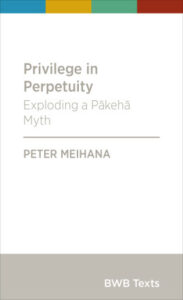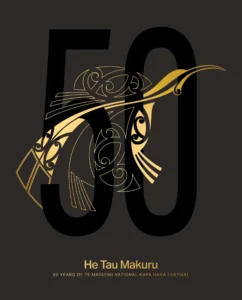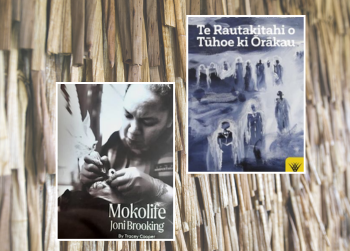Look back at the wars of the 1860s, through the nature of privilege in Aotearoa, and into the future through a re-examination of how we teach our tamariki. A broad range of topics have been added to our ever-expanding Māori collection recently; see below for a selection.
Tiakina te Pā Harakeke : ancestral knowledge and tamariki wellbeing
“Tiakina Te Pā Harakeke : Ancestral Knowledge and Tamariki Wellbeing discusses the values and successful practices of Māori childrearing that have been maintained and encouraged within whānau, hapū and iwi for generations. This book brings together knowledge and insights from a wide range of Māori experts across multiple disciplines. The authors explore childrearing approaches and models grounded in kaupapa Māori and Māori knowledge that encourage wellbeing outcomes for children and whānau and incorporate ancestral knowledge into practices for the contemporary world”–Publisher information.” (Catalogue)
Wawata : Moon Dreaming : daily wisdom guided by Hina, the Māori moon / Elder, Hinemoa
“Hina, the Maori moon goddess, has 30 different faces to help illuminate life’s lessons – a different face and a different energy for each day of the month. And with her changing light, new insights are revealed. This book gives us the chance to connect to the ancient wisdom of the old people, who reach forward into our lives, with each of the moon’s names as their offerings. Their reminders are a source of strength in our strange modern world, where we have been stripped of much of the connection and relationships we need for our wellbeing through successive lockdowns. This book leads you through a full cycle of the moon, to consider 30 aspects of life, and is designed to open up our moon dreams, for a deeper affectionate connection with ourselves and others.” (adapted from Catalogue)
Mokolife : te kanoi ote uhi : the female energies of the modern chisel / Cooper, Tracey
“Moko kauae are steadily becoming an everyday sight in homes, streets, offices, parks, and playgrounds throughout Aotearoa. Mokolife tells the story of Joni Brooking, one of our leading female moko artists, and some of the wahine whose lives she has changed forever and the challenges they have overcome. Mokolife provides an insight into a world few of us know and looks at what’s driving the current resurgence of moko kauae. It provides an in-depth explanation of all aspects of moko kanohi from the perspective of one of our leading female moko artists in an accessible and readable narrative. It is a valuable resource for students, artists, and anyone interested in learning more about this artform.” (adapted from Catalogue)
Ira Tākaro Māori : rethinking health, sport and education in Aotearoa/NZ / Brown, Harko
“Brown contends that since the mid-1800’s there has been a lack of attention to ira tākaro (or the schema) of Tamariki Māori in our health, sports, and educational institutes. He says this has often negatively impacted Tamariki Māori via scornful social discourses, for example, by educators critical of Māori children’s in-school behaviours, and in their overall academic and health statistics. He describes the natural expressions of ira tākaro in Polynesian children as pronounced and packed with powerful potential which at present is much maligned and misunderstood in general by hauora providers, particularly by those in the fields of mental health and child psychology, by sports and recreational providers and in teaching professions.” (Catalogue)
 Privilege in Perpetuity : exploding a Pākehā myth / Meihana, Peter
Privilege in Perpetuity : exploding a Pākehā myth / Meihana, Peter
“The ‘idea of Māori privilege’, as Meihana describes it, is deeply embedded in New Zealand culture. Many New Zealanders hold firm to the belief that Māori have been treated better than other indigenous peoples, and that they receive benefits that other New Zealanders do not. Some argue that the supposed privileges that Māori receive are a direct attack on the foundations of the nation. Privilege in Perpetuity charts the 18th-century origins of this idea, tracing its development over time, and assesses what impact this notion of privilege has had on Māori communities. Central to this history is the paradox, explored by Meihana, of how Māori were rendered landless and politically marginalised, yet at the same time were somehow still considered privileged. The idea of privilege is revealed as central to colonisation in New Zealand and the dispossession and marginalisation of Māori – and as a stubbornly persistent prejudice that remains in place today.” (adapted from Catalogue)
 He Tau Makuru : 50 years of Te Matatini National Kapa Haka Festival
He Tau Makuru : 50 years of Te Matatini National Kapa Haka Festival
“Te Matatini is the world’s largest celebration of contemporary Māori performing arts. This national kapa haka festival is held in Aotearoa New Zealand every two years. In 2022, Te Matatini celebrates its fiftieth year, and this book honours the festival. The book captures key memoirs from people involved in the festival since 1972. It features images from kapa haka stalwarts celebrating key moments in Te Matatini history, while also honouring those who have passed on and remembering their contributions through a legacy dedication section”–Publisher information.” (Catalogue)
Te Rautakitahi o Tūhoe ki Ōrākau / Temara, Pou
“An account of Tūhoe involvement in the battle of Ōrākau in the New Zealand wars by Sir William Te Rangiua ‘Pou’ Temara. Written in te reo Māori and based on oral sources, Tā Pou asks the big questions about the Tūhoe men and women who went to fight with Ngāti Maniapoto at Ōrākau. Who were they? Why did they go and what did they do there? What was the nature of their alliance with Ngāti Maniapoto? Tā Pou gives this account as a man from Ruatāhuna, where most of the Tūhoe who went to Ōrākau came from, through the stories told to him by his grandfather, great-grandmother and other kuia and koroua when he was young. The book includes significant Tūhoe whakapapa for those who went to Ōrākau.” (adapted from Catalogue)


